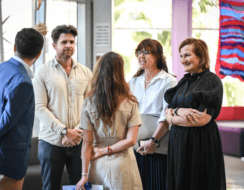28 Oct 2020
NewsUnlocking the benefits of regional settlement
In 2019 a group of Ezidi women were provided the opportunity to create a pop-up restaurant in Armidale’s Café Patisserie. Photo credit: Anna Kucera
Community organisation and social business SSI has overseen the settlement of over 300 refugees from Iraq and Syria in Armidale since February 2018 under the Federal Government’s Humanitarian Settlement Program (HSP).
SSI provides new arrivals with contracted HSP services, such as housing, orientation to community, links to education programs, training and employment assistance. In tandem with these services, SSI has implemented an integration model that includes community engagement, arts and culture, volunteering, project management, and marketing and communications.
Early results from this unique whole-of-community approach are extremely positive, with a high retention of new arrivals to date. This approach could be instrumental in the success of regional settlement strategies across Australia, if duplicated in other areas.
The Armidale community has forged countless connections with newcomers through community events, a volunteering service, newcomer-driven initiatives, and connections with sporting groups. At the same time, positive community attitudes toward the Ezidi refugees have strengthened.
SSI’s success in Armidale shows the benefits settlement brings for both regional host communities and those on humanitarian visas. Welcoming newcomers to regional sites can stimulate local regional economies, boost workforces and offset population decline. For the newcomers, a regional environment can offer a warmer, less confronting settlement experience than that available in cities.
As an advocate for stronger pathways to regional communities, SSI recognises that regional settlement arrangements must accommodate the needs of both new arrivals and host communities. To realise the full potential of such arrangements, it is essential that the host community finds meaningful ways to welcome and support newcomers in their settlement and that the newcomers feel empowered, welcome and at home in their new environment.
Armidale local shares skills with refugee and aspiring photographer
Armidale local and freelance photographer Simon Scott partnered with Settlement Services International (SSI) to use his skills to foster the talent of aspiring photographer and Ezidi refugee Salwan Qasm Muhi.
Mr Scott has lived in Armidale for 18 years with a successful career as a photographer, producing images for politicians, universities and organisations including the local youth support hub, Backtrack.
He has also travelled to Africa, teaching photography at an educational institution in Tanzania and documenting life stories for a string of humanitarian organisations and NGOs.
On learning of Armidale’s selection as a major refugee resettlement location, Mr Scott was eager to channel his skills and document the lives of his new neighbours or, better yet, teach them how to document and tell the story of their own lives.
Mr Scott contacted SSI and was connected to Mr Muhi, a young refugee with a desire to hone his skills and pursue a career as a photographer.
After a phone call facilitated by an interpreter, the duo met face-to-face and wandered the streets of Armidale, taking photos and discussing their image compositions.
Despite the language barriers, Mr Scott and Mr Muhi formed a strong artistic bond, with Mr Scott describing Mr Muhi as someone with a warm and positive attitude — and a sharp dresser.
When Mr Scott tasked his eager student Mr Muhi to photograph objects that were unfamiliar to him, the results were surprising.
As Mr Muhi, 21, walked through the streets of Armidale with a camera, he gravitated towards traffic signs and other items of street furniture.
“I asked him to photograph things that were new to him, and he took pictures of roundabout signs and give-way signs,” said Mr Scott.
“He was intrigued by zebra crossings. When any photographer is in a new area, there’s a wealth of things to discover, and it was fascinating to see what someone who’s seen a harder side to life found different in this environment.”
“I like cameras and I like taking pictures, and I want to learn how to be a photographer,” Mr Muhi said.
When Mr Scott had time free from his work shooting across New England and overseas, the pair wandered the streets, Mr Muhi equipped with one of Mr Scott’s hefty Canon SLR cameras.
They swapped words in English and Kurmanji, sometimes resorting to charades to get the point across. One of Mr Muhi’s funniest images is a picture of Mr Scott with his arms spread out, mimicking a plane to ask Mr Muhi how he arrived in Australia.
Mr Scott said Mr Muhi’s passion for photography was growing, while his own understanding of the Ezidi culture was also getting better.
“It’s nice to work with someone who genuinely wants to learn something new,” he said. “And this is my way of welcoming someone to the community, by helping with English and photography.”
Mr Scott is now keen to offer photographic workshops to the wider Ezidi community to provide them with another means of self-expression and to document their new life in Armidale.
Mr Muhi, meanwhile, remains determined to make it as a photographer if he can.
“I’d like to keep getting better to study and improve myself,” he said.
Learn more about SSI’s whole-of-community approach to regional settlement:
All in for Armidale: A whole-of-community approach for Ezidi settlement
Monitoring community attitudes toward refugee settlement in Armidale, NSW


